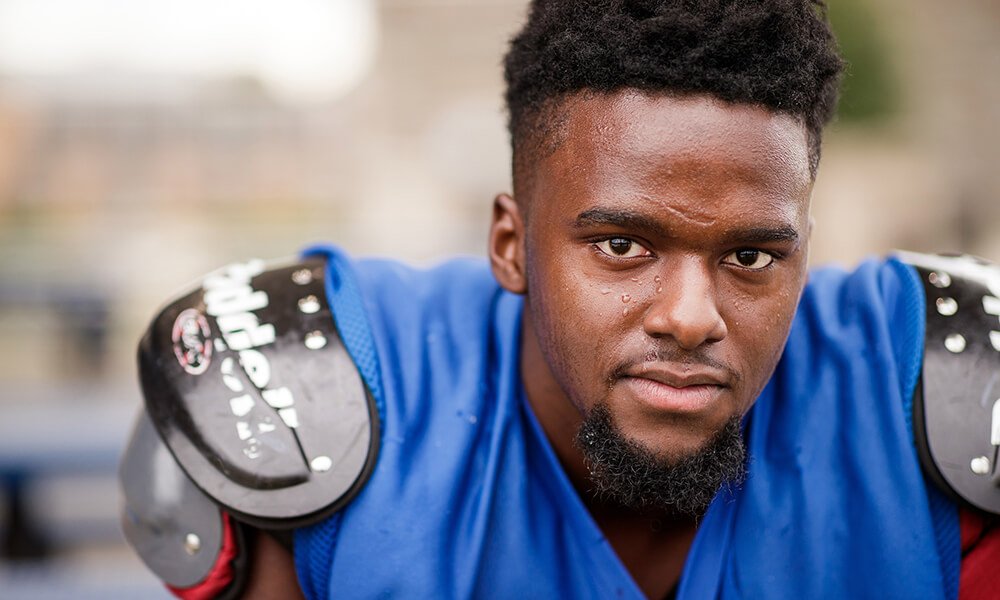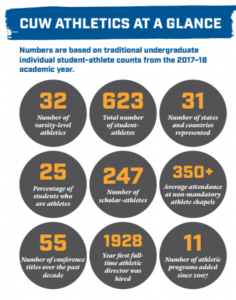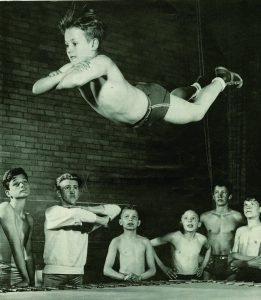
Editor's note: This story first appeared in the spring 2019 issue of the Concordian, the official magazine of Concordia University Wisconsin.
At age 7, Andrew Gordon watched his first professional hockey game, and the young Maryland native was mesmerized. The sport’s fast pace combined with the skill and technique of its athletes immediately had Gordon hooked.
He went home that day and begged to take lessons, but his parents, worried about the expense they’d incur for a passing phase, said no. Gordon persisted, and four years later he wore his parents down. In borrowed skates and hand-me-down pads, Gordon made his hockey debut at the age of 13, about eight years later than most athletes typically begin.
Due to his delayed start, hockey wasn’t initially on Gordon’s radar when he began his college search. Instead, he was drawn to Concordia for its pre-seminary major and was then thrilled to learn from his admissions counselor that Concordia offered not only an NCAA Division III hockey team but an American Club Hockey Association D-II team on par with his talents.

For a future LCMS pastor with a love of hockey, Concordia was the perfect fit. Along with its Ann Arbor campus, CUW is the only school in the Concordia University System to offer hockey programs. It’s one of the many perks of attending a mid-sized Lutheran university that offers a stacked athletic repertoire. With 32 athletic programs, Concordia boasts more organized sports than some people even knew existed. The university’s broad selection of athletic offerings, when paired with the close-knit community afforded by Concordia’s size and Christian atmosphere, is a combination few other universities throughout the nation can claim.
For that reason, there are hundreds of Concordians with variations of Gordon’s story—students who have traveled from near and far for the chance to pursue a rigorous academic experience, participate in an oftentimes niche athletic program, and grow in Christian character and faith during their time on campus.
Related: 5 times Concordia athletics were ahead of the game
Building a winning culture
Concordia has added 11 programs to its roster since the arrival of Athletic Director Dr. Robert Barnhill in 2001. Within that time, the university’s student-athlete count has doubled, thanks in part to the new additions. When Barnhill first began, Concordia claimed about 300 student- athletes compared to the more than 600 traditional undergraduate students who learn, compete, and grow in Christian faith at Concordia University today.
“When I came to Concordia, I took it as my charge to develop new programs that would bring more students to a campus where they could simultaneously learn, grow in their faith, and compete at a high level,” says Barnhill. “We have a unique opportunity to live out our mission at Concordia through athletics, and we are purposeful and proud of what we stand for.”
Related: Home court advantage: the Hafemann women
This purposeful approach involves hiring coaches who are the right mission fit for Concordia, as well as ensuring that student-athletes have ample opportunities to hear God’s Word, especially within the context of their sport. In his role as director of faith integration for athletics, CUW Hall of Fame inductee Dr. Jim Juergensen, Jr. (’93, ’95) works as part of Concordia’s Campus Ministry team and reaches students through pre-game devotions and prayers. He also organizes student leaders for the weekly Conditioning Our Run Eternally (C.O.R.E.) Bible study that’s geared toward athletes, and he keeps an open door for those organic moments when athletes might need a discerning ear.
“A lot of my role entails getting out there and making connections and planting the seeds,” Juergensen says. “Whether it’s through chapel, devotions, prayers, or Bible study, my goal is to make sure our athletes at Concordia are hearing that Gospel message consistently and are being exposed to the Word.”
Innovation from the start
This holistic approach to athletics has persisted throughout the university’s existence. Concordia’s inaugural athletic director, William C. Ackmann, set the standard for what the caliber, character, and conduct of a Concordia athlete should be.
The namesake of Concordia’s Athletic Hall of Fame served as athletic director from 1928 to 1955 and then dean of students until 1977. He came to Concordia on a gentleman’s agreement and without a stipulated salary—just room and board, and a job. Ackmann’s trust in Concordia’s mission and his passion for leveraging athletics as a means to cultivate the whole person was immediately evident. A 1948 yearbook articulated Ackmann’s philosophy well: “According to Bill, his job is to build men not only physically, but primarily mentally. All recognize in him the spirit he strives to instill in others—a dedication and zeal for physical fitness, coupled with a strong desire to build Christian sportsmen and future servants of God.”
Related: Stepping up to the plate

Like Barnhill, Concordia’s pioneer athletic director saw the value in offering a range of opportunities for students. It took Ackmann only a few weeks on campus to set up a long-range plan to develop and improve programs and facilities at Concordia for the benefit of all students. He’s well-known, for example, for championing the construction of a state-of-the-art swimming pool on the Milwaukee campus in the mid 1950s because he believed so firmly in the value it would bring to all varieties of Concordians.
Ackmann’s spirit of innovation and industriousness also famously prompted him to purchase a trampoline when the apparatus was still a virtual unknown. The modern-day trampoline is said to have been invented in 1930 by George Nissen, but it wasn’t until 1942—at least a year after Ackmann introduced one to Concordians—that Nissen and his collegiate gymnastics coach formed a company to mass-market their product.
Thanks to Ackmann’s purchase, several Concordia students bounced their way into the June 30, 1941 issue of LIFE in the midst of the now- defunct magazine’s Golden Age. The spread, titled “Concordia College Boys Try Some New Exercises on a Circus Trampolin,” delivered an instructional approach for using the cutting-edge contraption and credited Ackmann for purchasing the equipment after seeing it in a circus act.
Advancing the play
Concordia’s Field House no longer features a trampoline, and the ultramodern swimming pool was left behind with the old campus. Today in their place are four competition-grade athletic fields—including Kapco Park, a state-of-the-art $3.4-million facility that’s shared by Concordia’s baseball team and the Lakeshore Chinooks— the 2,000-person capacity R. John Buuck Field House, six recently constructed tennis courts, a widely used fitness center, a cross country trail that boasts scenic views of Lake Michigan, and, the most recent addition, the 6,000-square-foot multipurpose Catalyst Sports Training Center. In addition to its on-campus facilities, the university partners with community groups to offer its triathlon, shooting, tennis, golf, and hockey players practice spaces within minutes of the campus.
It’s all part of the appeal for the 600-plus students who, like seminary-bound hockey enthusiast Andrew Gordon, have found their place as a student-athlete at Concordia.
If you’re interested in becoming a Concordia athlete or you want to find opportunities to root on the home team learn more at cuwfalcons.com.
The spring 2019 Concordian hit mailboxes the beginning of May. View a PDF version of the magazine here. If you are not on our mailing list, but are interested in receiving a free copy, call 262-243-4333.
— This story is written by Kali Thiel, director of university communications for Concordia University Wisconsin and Ann Arbor. She may be reached at kali.thiel@cuw.edu or 262-243-2149.
If this story has inspired you, why not explore how you can help further Concordia's mission through giving.